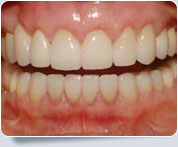If your tooth hurts, the pain usually comes from one of two sources.
| Pain can come from inside the tooth, and it indicates that there is an irritant affecting the tooth. | |
| Pain can come from the ligament that attaches your tooth to the jaw. |
If your pain comes from inside, usually it is aggravated by cold, air, sweets, or heat. If any of these makes your tooth hurt worse, your tooth is irritated. Then it becomes important to know if you need to see your dentist.
There are two general cases where you absolutely need your toothache treated. If, when the tooth is provoked, the toothache lingers for more than one or two seconds, the tooth almost certainly needs to be treated. For example, let's say your tooth is sensitive to cold. You drink cold water, and you get a sharp jab in your tooth. In that case, it may not need any treatment. But if that jab persists more than two seconds, see your dentist. You probably need a root canal treatment.
Many people fear root canals. However, with recent technological advances, these appointments themselves are generally not painful, nor are they traumatic—there isn't a lot of grinding as there is with a filling or a dental crown. Most of the work is done with small hand instruments. And when the tooth is dead, which is often the case, it can even be done with no novocain. Root canal treatment often means the relief of toothache pain, and often that relief is immediate and dramatic. Extraction—taking a tooth out—is much more traumatic, from my experience as a dentist.
Also, if the pain progresses to where your tooth hurts without any outside stimulus, that is the second situation that definitely indicates you need to see a dentist, quickly. But if the pain is only provoked by a stimulus, and then it is only transitory, even if it hurts quite bad, there is still a chance that it could get better on its own.
The other source of toothache is the ligament that attaches the tooth to the bone. When the infection inside your tooth spreads through the tooth apex to the bone around the tooth, your toothache may become this type. In this case, cold or heat or air won't bother you at all, but your tooth will be sensitive to biting. However, most of the time when your tooth is sensitive to biting, it isn't infected. Check the link below for more information about sensitivity to biting.
The more promptly you seek attention for your toothache, the less likely you are to have pain after the treatment. When your tooth is infected, the longer you allow the infection to become entrenched, the more likely you are to have that infection try to spread when it's treated.

